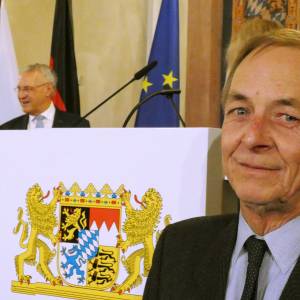Willkommen
Allsorts at the table and most of them, most of the time get on fine. There is a good sized family of jays that have their hour which seems to always be whenever the food has been topped up especially with monkey nuts - they like to peanut-pick and eat them too. The occasional blackbird causes a short scare but only because the others think it's one of the four crows that has come to take its share. To be fair the crows never land on the table but remain on the ground taking whatever crumbs are knocked down from the overflowing bounty of food on the table.
-----------------------
Sovereignty
"So far as sovereignty is concerned the root problem ‐ in the immigration field as in many others ‐ is that Member states all want changes but unfortunately not all want the same changes. Often the desires of one Member State diametrically conflict with those of another. Each can manifestly not prevail. The Treaties provide for such differences of opinion to be resolved by voting and for Member States to be bound by the result of such votes which are sometimes unanimous, sometimes by a weighted majority and sometimes by a bare majority. Any particular Member State will win some arguments and lose others.
Here we come to the nub of the sovereignty problem. Some say that the acceptance of such a binding dispute resolution mechanism is itself an exercise of national sovereignty as is the conclusion of any other treaty. Others say that having to submit to the views of others with whom one does not agree in relation to a particular matter is the very negation of sovereignty.
It is legally perfectly clear as a matter of law that in some areas the last word lies with the European Institutions ‐ legislative and judicial ‐ rather than national institutions. I see no political possibility of this being changed. However there is room for procedures which increase the influence of national Parliaments in the drafting of Union legislation and the taking of Union decisions. The result of this may be decisions which are more to our liking: it may equally be decisions less to our liking.
One must recognise the tension between national parliaments and the European Parliaments. If a Member State’s focus is rigidly concentrated on advantaging itself to the maximum degree possible ‐ and that seems to be the position of both sides of the argument in this country and indeed elsewhere ‐ then there will be an emphasis on national parliaments and national Ministers. If the emphasis is on advantaging Europe as a whole then the emphasis will be on the European Parliament and the Commission."
The Rt Hon. Sir Konrad Schiemann QC. 2015
Called to the Bar (Inner Temple) in 1962 and was appointed Queen’s Counsel in 1980. He was made a Justice of the High Court (Queen’s Bench Division) in 1986 and a Lord Justice of Appeal and a Privy Counsellor in 1995. In 2003, he was appointed the UK’s Judge in the European Court of Justice, from which he retired in 2012

Comments New comments are not currently accepted on this journal.